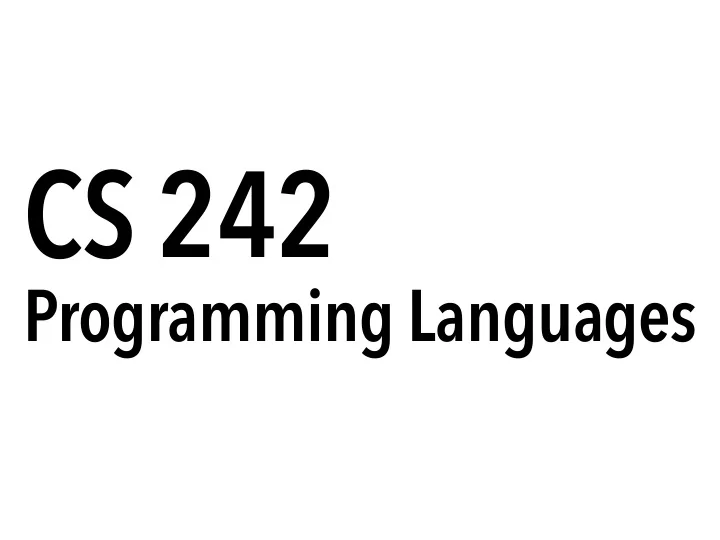

CS 242 Programming Languages
Course staff John Jintian Will Varun
Today’s goals • What is a programming language? • How do we learn about them? • Why is the study of PLs important?
What is a programming language?
“A vocabulary and set of grammatical rules for instructing a computer to perform specific tasks.” - Fundamental of Programming Languages (Ellis Horowitz) “A programming language is a notation for writing programs, which are specifications of a computation or algorithm.” - Wikipedia “Programming languages are the medium of expression in the art of computer programming.” - Concepts in Programming Languages (John Mitchell) “A good programming languge is a conceptual universe for thinking about programming”. - Alan Perlis
When in doubt: majority vote!
My proposed definitions • Programming model A precise, composable specification of things • Programming paradigm Common properties of models • Programming language Syntax for expressing a programming model • Program Instance of: a model (abstractly) or a language (concretely)
Definitions matter because they shape understanding and direction Andy Ko, SPLASH 2016
This course covers general-purpose PLs • “Turing-complete,” but that’s not a useful standard • Described through abstractions over data and control - Abstraction: means of hiding complexity via interfaces - Data: information about things and their relationships - Control: producing new data and interacting with outside world • Abstractions chosen based on: - Mapping to underlying resources - Ease of understanding for humans - Distance to “actual” description of the problem
Prolog demo
Complete (unsafe) control, little data
A language is also its… • Compiler • Package manager • Debugger • Libraries
Course goals • Understand the concepts underlying modern PLs - Distinguish syntax from semantics, language from model - View the world in diffs: “it’s just X but with Y” • Explore the tradeoffs in common design decisions - Scripting languages are expressive, but hard to debug and maintain - Functional languages are safe, but hard to program - Systems languages are fast, but don’t map to the problem domain • Learn by doing: both use and implement language features - Assignments are mostly coding
Syllabus Weeks 1-2 Weeks 3-5 Scripting Functional ADTs/pattern matching Dynamic typing Garbage Language meta theory Reflection collection Object systems Continuations Functions Embedding Static typing Variables Scoping Memory management Parallelism/concurrency Systems Weeks 6-7
Course structure • Programming assignment every week (70%) - Released Wednesday evening after class, due 4:20pm next Wednesday - Learning three new languages, so start early to iron out logistics • No midterm - Assignments are a little bit harder to compensate • Final project, not an exam (30%) - More details later in the semester - Final exam slot will be used for presentations
Expected prerequisites • Required: moderate programming experience - Know well at least one general-purpose language (C, Python, Java, …) - Also assume CS 107 level of systems knowledge • Required: basic logic - First order logic (boolean algebra, quantifiers) - You’ve written proofs before, know what induction is • Recommended: command line experience - Makes your life easier dealing with different programming environments
Tech stack • Course website: cs242.stanford.edu - Lecture slides, assignment handouts • Announcements/assignment help: Piazza • Grades: Gradescope • Assignment submission: FarmShare2 cluster
For next lecture • Follow the Lua installation guide • Come to lecture with your laptop and editor at the ready
Why study PLs? • Everything old is new again - Declarative programming - Type inference - Algebraic data types - Closures/lexical scoping • Entering an era of domain-specific languages (DSLs) - Big data: Spark, TensorFlow, Halide, … - Interfaces: HTML, LaTeX, jQuery, React, D3, …
Recommend
More recommend